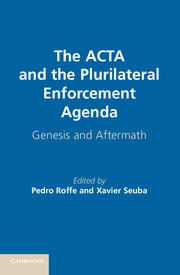Book contents
- Frontmatter
- Contents
- List of Contributors
- Foreword
- Acknowledgments
- Acronyms
- Introduction
- PART I THE FINAL ACT: ITS MAIN FEATURES AND CONTENTS
- 1 An Overview of the Agreement
- 2 ACTA Initial Provisions and General Definitions
- 3 ACTA General Obligations with Respect to Enforcement
- 4 Provisions on Civil Enforcement – Section 2 of ACTA
- 5 Legal Framework for Enforcement
- 6 ACTA and Beyond
- 7 ACTA’s Digital Chapter
- 8 The ACTA Committee
- PART II DOMESTIC LEGISLATIVE CHALLENGES
- PART III IMPACT ON RELATED PROCESSES
- PART IV VIEWS FROM STAKEHOLDERS: LESSONS
- PART V WHAT LIES AHEAD ACTA
- Annex I Anti-Counterfeiting Trade Agreement
- References
- Index
- References
5 - Legal Framework for Enforcement
Border Measures
Published online by Cambridge University Press: 05 December 2014
- Frontmatter
- Contents
- List of Contributors
- Foreword
- Acknowledgments
- Acronyms
- Introduction
- PART I THE FINAL ACT: ITS MAIN FEATURES AND CONTENTS
- 1 An Overview of the Agreement
- 2 ACTA Initial Provisions and General Definitions
- 3 ACTA General Obligations with Respect to Enforcement
- 4 Provisions on Civil Enforcement – Section 2 of ACTA
- 5 Legal Framework for Enforcement
- 6 ACTA and Beyond
- 7 ACTA’s Digital Chapter
- 8 The ACTA Committee
- PART II DOMESTIC LEGISLATIVE CHALLENGES
- PART III IMPACT ON RELATED PROCESSES
- PART IV VIEWS FROM STAKEHOLDERS: LESSONS
- PART V WHAT LIES AHEAD ACTA
- Annex I Anti-Counterfeiting Trade Agreement
- References
- Index
- References
Summary
Introduction
In addition to specific provisions dealing with civil and criminal enforcement, as well as enforcement in the digital environment, ACTA contains a section prescribing how states bound by the agreement must provide for measures of IP enforcement at the border. In section 3 of Chapter II, Articles 13 to 22 contain rules on the scope of border measures (Articles.13, 14 & 16), the initiation of proceedings by right holders or custom authorities (Articles.15–17) and a further procedure that deals with allegedly infringing goods (Articles.18–22). These rules must be viewed in the context of the enforcement provisions in the TRIPS Agreement, in particular Articles 51–60. In general, ACTA goes beyond TRIPS and requires states to adopt higher enforcement standards. At the same time, the new treaty narrows those TRIPS provisions that protect the interests of traders and owners of goods subject to border measures. This chapter discusses some particularly controversial aspects of these “TRIPS-plus” standards for enforcing IPRs at the border. The focus is on whether ACTA mandates (or allows) the seizure of goods – such as generic medicines – in transit, and what safeguards the final text of the agreement contains to avoid such seizures.
Scope of ACTA Border Measures
ACTA’s provisions on border measures extend the existing minimum standards under TRIPS Article 51, which obliges WTO members to foresee border measures only against “importation of counterfeit trademark or pirated copyright goods.” Together, ACTA Articles 13 & 16 determine the IP infringements and the trade activities for which parties to the agreement must foresee border measures in their national laws. These rules were amongst the most contentious issues during the treaty’s negotiations.
- Type
- Chapter
- Information
- The ACTA and the Plurilateral Enforcement AgendaGenesis and Aftermath, pp. 88 - 99Publisher: Cambridge University PressPrint publication year: 2014

